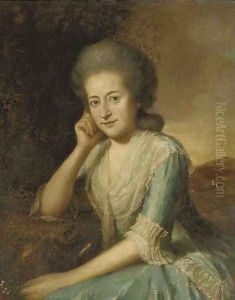Jean Humbert De Superville Paintings
Jean Humbert de Superville, born in 1770 in Rotterdam, Netherlands, was a multifaceted Dutch artist, whose work and scholarly pursuits spanned various disciplines including drawing, painting, and writing on art theory. He is perhaps best remembered for his influential theoretical work rather than his artistic output. Humbert's contributions to art, especially his theoretical explorations, positioned him as an intellectual figure in the early 19th-century art world, bridging the gap between the neoclassical and romantic movements.
Humbert's early life was marked by his education in Paris, where he was exposed to the neoclassical ideals that dominated the art scene of the late 18th century. However, his work and theoretical writings later showcased an inclination towards the emerging romantic sensibilities, emphasizing emotion and individualism over the strictures of classical forms. This duality of influence is evident in his varied oeuvre, which includes not only traditional paintings and drawings but also an extensive body of written work that explores the symbolic and expressive capabilities of art.
In 1827, Humbert published his seminal work, 'Essai sur les signes inconditionnels dans l'art' ('Essay on Unconditional Signs in Art'), which argued for the existence of universal symbols in art that could convey deeper, innate meanings. This theory was groundbreaking, suggesting that art could transcend cultural and historical boundaries to evoke a shared human experience. Humbert's ideas anticipated some of the concerns of later art movements, such as Symbolism, and his work on symbols and their meanings in art had a lasting impact on the development of modern art theories.
Throughout his career, Humbert de Superville remained engaged with the academic art community, though his work was often more appreciated by theorists and philosophers than by the mainstream art market. His legacy lies not in widely recognized artistic masterpieces but in his profound influence on the understanding of art as a vehicle for expressing universal human truths. Jean Humbert de Superville died in 1849, leaving behind a body of work that continues to be studied for its contribution to the philosophical underpinnings of modern art.
